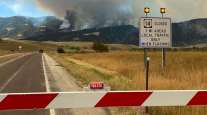Ferro Hears From Truckers, Again Defends HOS Restart
This story appears in the April 7 print edition of Transport Topics.
LOUISVILLE, Ky. — Anne Ferro, head of the Federal Motor Carrier Safety Administration, heard the concerns of truck drivers, fleet owners and brokers about such issues as electronic logging and knowledge testing for newcomers, as well as the controversial hours-of-service restart provision during the Mid-America Trucking Show here.
Face to face with the people most affected by her agency’s decisions, Ferro said she remains confident of the sleep science behind the 34-hour restart segment of HOS and that it is the responsibility of carriers to raise compensation for drivers if obeying the rule cuts into wages.
“If companies want to keep good drivers, they should pay them for doing the very tough job they have to do,” Ferro said of the restart provision that started in July.
Since the July 1 rule change, fleet managers have asserted evidence of lost driver productivity, which slices into take-home pay. They also say it heightens the level of highway traffic on Monday mornings.
The issue of wage erosion is a serious matter, Ferro acknowledges, but after studying the rule, she said many drivers don’t need to use the restart, and many who do, don’t have a Monday morning schedule for returning to work.
As for knowledge testing, Ferro and several agency colleagues gathered input from the industry about what should be in the regulation ordered by Congress. These exams are given to managers of new motor carriers and freight brokers and forwarders.
The session — the second of three — was mostly well-received, but two brokers from small firms opposed it.
David Owen, president of the National Association of Small Trucking Companies, said testing for new entrants “is an idea that is long overdue.” If truck and bus drivers have to get special commercial driver licenses, Owen said, then company managers also should have to demonstrate knowledge and ability.
He requested that FMCSA aim the tests at small cities and rural areas because trucking startups are rarely in metropolitan areas. Owen also said the agency should place a tutorial on its website.
Karalet Cole runs CC&C Trucking in Roundhill, Ky. She started with one truck in 2010 and now has six. She supported the rule.
“We’re still in that ‘I’m not sure of what to do’ stage. I think testing would be a good idea. We didn’t have the knowledge when we started and were muddling through,” Cole said.
James Lamb, president of the Association of Independent Property Brokers and Agents, said testing for freight brokers should be either limited or not done at all because it would “restrict and hinder small entrepreneurs.”
Lamb said brokers, unlike motor carriers, do not actually move freight. Instead, they make arrangements to have it done. AIPBA is a trade association for small brokerage firms.
Because FMCSA’s function is promoting and ensuring highway safety, the agency “does not have expertise” in the training and testing of brokerages, Lamb said.
The new electronic logging device proposal came up often, even though it was not a part of the session.
Owner-operator Michael Potwin said he has worked in trucking since 1978 and likes some technology, including his smart phone. He said he has used an ELD and that drivers “should know how to use them.”
He also said that “they keep track of hours better than I can, and it means I don’t have to worry about the math.” Still, Potwin said ELD use should be optional
Driver Robin Webb is just the opposite. He admitted to being “computer illiterate” and said he doesn’t “understand the concept of technology.”
However, he started learning about trucking in 1968 at age 12 when his uncles taught him and has worked in trucking throughout his adult life, tracking his hours with paper and pen and driving precisely. He doubted he could, or would, make the transfer to an ELD.
Ferro said afterward that ELDs are a hot topic about which she heard a great deal while meeting with drivers on the parking lot of the University of Louisville football stadium.
She said Congress ordered in the MAP-21 highway funding bill that FMCSA must write an ELD rule, and the proposal was published last month. She urged drivers and others to comment on the ELD and knowledge testing rules.
Overlapping with the listening session at MATS was a seminar to help users understand the proposal and the different types of devices. It was conducted by Rand McNally, a provider of mileage and routing software for ELDs.
Amy Krouse, director of marketing for the company, said most people were inquiring about costs, which have come down significantly over the past few years. They also were seeking assurances that if they purchased an ELD in 2014, it would meet the rule’s specifications if it becomes law in the future.
Managing Editor Neil Abt contributed to this story.



